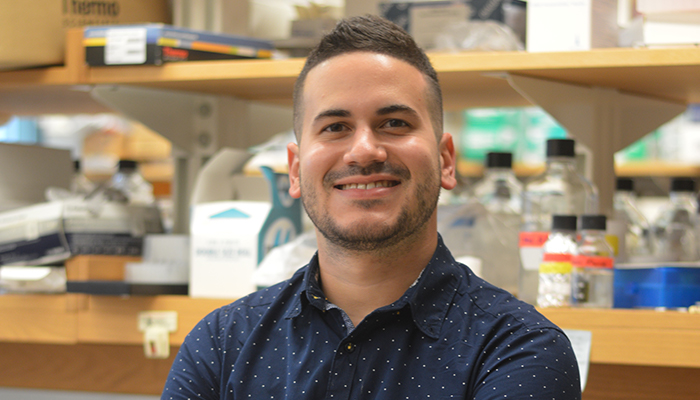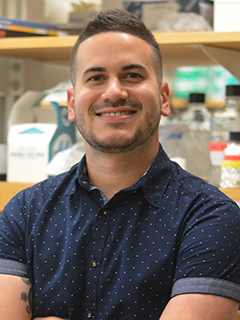HOW CAN WE HELP YOU? Call 1-800-TRY-CHOP
In This Section
Featured Research Trainee: HHMI Gilliam Fellow Franklin Staback Rodríguez

Franklin Staback Rodríguez is one of two CHOP/Penn HHMI Gilliam Fellows for 2022.
The Featured Research Trainee for August is Franklin Staback Rodríguez, a fourth year PhD candidate working in the lab of Janis Burkhardt, PhD. Staback Rodríguez and Dr. Burkhardt are one of 51 student-advisor pairs awarded a 2022 Howard Hughes Medical Institute Gilliam Fellowship for Advanced Study. Gilliam Fellowships seek to increase diversity of scientists at the college and university faculty level by supporting scientists who will become scientific leaders. Staback Rodriguez is in the Immunology Graduate Group program, part of Biomedical Graduate Studies in the Perelman School of Medicine at the University of Pennsylvania. He received a B.S. in Cellular and Molecular Biology from the University of Puerto Rico, Rio Piedras Campus, and then completed a post-baccalaureate program at Case Western Reserve University. In this Q&A, Staback Rodríguez discusses the Gilliam Fellowship, his research, and what he does for fun. Check out the September Featured Trainee, Jose Campos Duran, also a HHMI Gilliam Fellow.
Tell us about the HHMI Gilliam fellowship and what this accomplishment means to you.
The HHMI Gilliam Fellowship for Advanced Study aims to advance diversity and inclusion in United States-based science. This award stands out because, in addition to supporting the student's research and progress toward scientific leadership, it also supports mentor activities and institutional changes to create a healthy academic ecosystem. I see this fellowship as a fantastic opportunity to improve as a leader in STEM and as a scientist. In many ways, this award is a direct result of the training I embarked on in 2018 as a Postbaccalaureate Research Education Program scholar under Dr. Parameswaran Ramakrishnan at Case Western Reserve University, with whom I first began writing and applying to grants. This fellowship will support the continuation of this training as I work toward a career as an academic researcher.

Franklin Staback Rodríguez
In addition to funding my thesis research, this fellowship brings many fantastic opportunities such as becoming a part of the HHMI scientific community, presenting my work to my HHMI peers, and travelling to scientific meetings. Additionally, I will take part in professional development sessions aimed at training to be an inclusive mentor and leader in STEM.
This fellowship represents my promise to continue serving the scientific community and learning how to best promote an environment of opportunity, inclusivity, and acceptance in academia. It is a promise to be the best mentor and leader I can be in hope of paying forward all the advice and support others, like Dr. Burkhardt, have given me thus far.
What are some research projects you are currently working on, and why are they important?
Research in the Burkhardt Lab centers on understanding the molecular control of immune cell migration. For these cells, correctly regulated migration is necessary for development and function during an immune response. Though cell migration is typically thought to fall under cell biology, it's really an essential part of immunology. By looking at immune cells through a cell-biological lens, I am trying to answer lingering questions that will provide a better understanding of the immune system overall. As immune-based therapies continue to develop, I believe that understanding immune cell migration will allow us to create better therapeutic tools.
My current project seeks to characterize the signaling pathways that allow T cells to navigate complex environments as they search the body for pathogens. During this process, T cells encounter chemical signals — chemokines, for example — that guide them to migrate into, within, and out of tissues. Our lab has found that two chemoattractants, CCL19 and S1P, induce very different forms of T-cell motility, as observed in a microscope. I am working to define the molecular events that differentially regulate CCL19 versus S1P responses, and to determine how these signals direct T-cell migration in complex environments.
What are some of the most salient experiences you've had at CHOP, research or otherwise?
Aside from getting the news of this grant during a meeting with Dr. Burkhardt and doing a lot of jumping for joy? I suppose that for me, like for all students in graduate school, the most impactful experience has been training during the pandemic. In 2020, despite what the world was going through, I had to finish my graduate coursework and find a thesis lab during a time when research was practically not happening, and then prepare for my PhD candidacy requirements. Thankfully, in my lab, in my department, and with Dr. Burkhardt, I found the energy, support, encouragement, and warmth that got me through some stressful and hectic months. During the candidacy exam, I felt like I had prepared well and did the best I could do at the time ... and I passed. That felt amazing, especially on a personal level and as the first of my family to do this.
Aside from research, what do you consider your biggest accomplishment?
I think the journey is often overlooked in favor of recognizing accomplishments or "wins." At this point in my life, I consider my biggest accomplishment to be getting so far as a scientist and as a person. I am a first-generation immigrant from Venezuela and a first-generation Puerto Rican college student and scientist. There were many socioeconomic, political, institutional, and even meteorological events that should have otherwise held me back from achieving my dreams. But even during the aftermath of Hurricane Maria, I always had science as my escape. These events seemed to trigger the need to persevere like my parents did: They left everything in Venezuela so that my sister and I had a chance at a better life. Though I could never fully visualize what my career would look like, I continued taking small steps to change my circumstances.
What do you do for fun when you're not working?
I have different interests and love diving deep to learn about them. I have the most fun connecting with others over food and drinks, sports, and music. As a foodie, I love eating and learning how to cook different foods. I also enjoy beer and whiskey and am interested in knowing how different styles are made. Sports connect me to my culture and with friends all over the world. Additionally, in my life and during lab time, Caribbean music is always present, but dancing and singing with my friends is the best part. All these things make me feel at home, and I get to share them all with my partner.